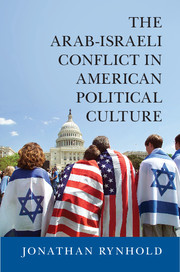Book contents
- Frontmatter
- Dedication
- Contents
- Acknowledgments
- Introduction
- 1 Like U.S.: American Identification with Israel
- Part I Party and Ideology
- 2 Republicans, Conservatives and the Right: The Surge in Support for Israel
- 3 Democrats, Liberals, and the Left: Rising Criticism of Israel
- Part II Protestants
- Part III Jews
- Notes
- Bibliography
- Index
2 - Republicans, Conservatives and the Right: The Surge in Support for Israel
Published online by Cambridge University Press: 05 February 2015
- Frontmatter
- Dedication
- Contents
- Acknowledgments
- Introduction
- 1 Like U.S.: American Identification with Israel
- Part I Party and Ideology
- 2 Republicans, Conservatives and the Right: The Surge in Support for Israel
- 3 Democrats, Liberals, and the Left: Rising Criticism of Israel
- Part II Protestants
- Part III Jews
- Notes
- Bibliography
- Index
Summary
The acrid and unexpungable odor of terrorism, which has hung over Israel for many years, is now a fact of American life … Americans are targets because of their virtues – principally democracy, and loyalty to those nations that, like Israel, are embattled salients of our virtues in a still-dangerous world.
—George Will, September 12, 2001Introduction
For many years support for Israel was associated more with liberals and Democrats than with Republicans and conservatives. However, in the first decade of twenty-first century, this was no longer the case. George W. Bush is widely regarded as the most pro-Israel president ever, while in the 2012 Republican primaries, candidates were falling over themselves to demonstrate support for Israel. The candidates were not just expressing their own convictions, they were responding to the fact that Israel has become an important issue for the Republican base. Indeed, between 2000 and 2010, sympathy for Israel over the Palestinians among Republicans rose from 60 to 85 percent, far outnumbering the percentage for Democrats, and conservative Republicans were the most pro-Israel of all.
This chapter surveys and analyzes conservative and Republican approaches to Israel and the Arab-Israeli conflict. The chapter begins with a look at levels of identification with conservatism among the general public and within the Republican Party. A brief survey of conservative attitudes to Israel during the Cold War is then presented. Subsequently, the three main approaches to the Arab-Israeli conflict and the Middle East among Republicans and conservatives in the post–Cold War era are sketched out, with the focus being on the intellectual and political elites. First, there is the “old conservative establishment,” whose approach towards Israel is one of “unfavorable neutrality.” Second, there is Kissingerian realism, which adheres to an approach of “favorable neutrality” toward Israel. Third, there is the “new conservative mainstream” that strongly identifies with, and sides with, Israel. This has become the dominant approach among Republicans and conservatives in the twenty-first century. Following this, narratives of the rise and fall of the peace process from the early 1990s until the end of the first decade of the new millennium are surveyed through the coverage of the relevant issues in the main conservative magazines and columns of a number of leading conservative columnists. Finally, attention turns to the attitudes of rank-and-file Republicans and conservatives.
- Type
- Chapter
- Information
- The Arab-Israeli Conflict in American Political Culture , pp. 31 - 57Publisher: Cambridge University PressPrint publication year: 2015

